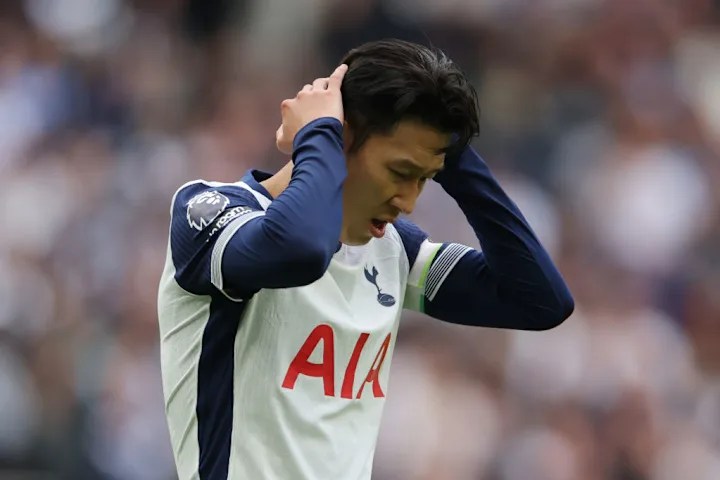
After ten games of the 2023/24 Premier League season, Tottenham Hotspur had hailed Ange Postecoglou as their outback overlord.
The Australian had found a club in ruin following a four-year spell in which he was preceded by Jose Mourinho, Nuno Espirito Santo and Antonio Conte. With the promise of a new era predicated on a unique and entertaining style of play, Spurs gave themselves into Postecoglou, his gift of the gab and the firsthand results.
Four games into the 2024/25 campaign, Ange-mania feels like a fever dream of yesteryear.
Sunday’s limp 1-0 loss at home to Arsenal in the north London derby characterised this recent stretch of Postecoglou’s tenure. Though Spurs were easy on the eye and dominated the ball, they seldom got it into dangerous areas and were too predictable at both ends.
It was a tale all too familiar, both under this management and in the modern history of the club. So much promise, so little delivery and ‘conviction’ as the Spurs boss put it.
Speaking to the press post-match, Postecoglou cut a particularly grizzly figure, reasserting that he ‘always’ wins trophies in his second season with a club.
The problem is he is currently in charge of Tottenham.
What is success to Tottenham? At this stage of ENIC’s ownership, it is definitely delivering silverware. Wednesday’s trip to Coventry City in round three of the Carabao Cup is must-win – every match in a domestic trophy will be.
But Spurs are no longer as good as some of their past selves, the better teams who came before them and still went pot-less. What was once a tongue-in-cheek joke to antagonise fans has become the monkey the club just cannot shake off their back. They are a big team that doesn’t win trophies anymore.
What have they won? What have they won? What have they won? What have they won?
Tottenham, eerily similarly to England, have reached a point where winning a trophy would be like having a tumour removed from the body. The fanbase has been conditioned to reject the notion of treatment and cure, yet clutch to the wistful belief of freedom. It is much easier to want to begin new again and again and again than to try and reach a natural end.
A freer existence only awaits once this process is over.
All the while, Spurs are trying to smash the glass ceiling they have endeavoured to place themselves back under in recent years. Let’s try and visualise that.
|
Tier |
Description |
Clubs |
|---|---|---|
|
Tier 1 |
Title-challengers with potential to win Champions League |
Man City, Arsenal |
|
Tier 2 |
Outer bracket of title-challengers with potential to break into tier 1 |
Liverpool |
|
Tier 3 |
Established teams with Champions League potential |
Tottenham, Chelsea, Man Utd |
|
Tier 4 |
Newly-dominant teams looking towards long-term establishment |
Newcastle, Aston Villa, West Ham |
That’s the simple table breakdown – and one rooted in subjective theory only, I encourage people to get mad if they disagree – but it’s also important to denote context.
Manchester City are richer than god and have arguably the best manager of all time in charge. Unless they get sanctioned for 115 potential breaches of Premier League rules, it’s hard for Tottenham to realistically compete.
Arsenal and Liverpool are perhaps the models other clubs should look to and aspire to recreate – a prolonged period of competitiveness built around identity, sensible recruitment and incremental improvement. The extra kick in the teeth to Tottenham is they have been overtaken and lapped by the pair, again the sinking feeling of paradoxical resignation seeping back in.
Though Spurs have closed the gaps to those clubs financially, they remain without the legacy and heritage of two of the world’s most successful football teams. This is another consideration against them with the other sides grouped into tier three, Chelsea and Manchester United.
What deemed Mauricio Pochettino’s era successful was his ability to smash right through the glass ceiling, teetering Tottenham between tiers one and two for the majority of his reign.
Postecoglou’s team is in a state not too dissimilar to that at the same point of Pochettino’s tenure. He too was maligned and doubted after losing to Arsenal in September of his second season.
Unlike Pochettino at that point, Postecoglou has made no secret of his desire to not just win trophies, but league titles with Tottenham. It’s the most ambitious task of his storied career to date, and one he sees as part of his remit, otherwise he wouldn’t be in N17.
It would be a tad disrespectful to totally doubt and cast aside Postecoglou given his body of work across the world. Speaking on The Athletic’s The View From The Lane podcast, journalist Vince Rugari – author of Postecoglou’s biography – stressed he has always overcome the hump currently befuddling Tottenham.
Postecoglou shouldn’t be defined by the fast if naive football his teams play, but the success which comes after they iron out the kinks. Sure, he’s never managed in a competition like the Premier League until now, but he’s earned the right to manage one of its leading teams such has been the overwhelming glory which has followed him all over the globe.
That’s hard to believe, to stomach and to digest after such a defeat in a derby. Factor in Spurs’ characteristic pessimism and it’s effectively impossible to envisage.
But as Postecoglou said at his press conference on Tuesday, “Every game is an opportunity to get on that road to success.” Now you just need to imagine him saying that in his raspy voice and distinct accent rather than David Brent. There’s that Spurs paradox again.


